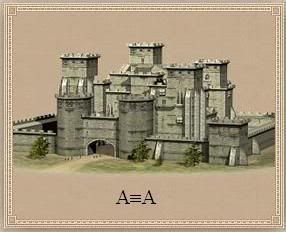Gay Marriage: The Final Word

I don’t see much to argue with here except to point out that while marriage was created to serve certain ends, there is nothing to indicate those ends cannot change. Additionally, I don’t see how marriage falls into either category of a fixed concept, which lends credence to the assertion that it is a malleable concept.The ends marriage was created to serve may change, but what should that mean for marriage? Marriage can either change (impossible if it's a fixed concept) or it could always perish, replaced by a different social arrangement based on a different concept. If gay marriage is an alteration of marriage, it's really a destruction of it and a replacement by a new institution, based on a new concept. That still doesn't refute the immutabilty of the concept; in fact, it reinforces it.
I agree that a marriage involves certain features. It involves at least two people creating a contract and the contracting parties receiving benefits from the government. I don’t see any reason why a contract between homosexual couple (or other combinations) cannot have those features. Certainly there are more features to traditional religious marriage, but that’s not the issue. The issue is state-sanctioned “marriage,” which probably needs quotation marks more than gay marriage needs them.That's a definition of marriage pregnant with legal meaning. I've already admitted that the government may institute any arrangement it wants, and give it any name it wants, but this does not change reality. If marriage is nothing more than a relationship of contracting parties with certain statutory benefits accruing to that particular contractural relationship, then the government can change it at will. If marriage is something else, nothing the government does cn really change it.
There is no real meaning of state-sanctioned marriage outside the legal meaning. It’s a creation of the state. There is no separate real meaning of social security or welfare; the legal meaning is the real meaning.Really? But state-sanctioned marriage did not arise ex nihilo. Nor do I think it useful to concentrate on marriage-as-sacrament, because even irreligious cultures have the institution, and marriage exists across very different religious beliefs anyway. Marriage as an institution is prior to the government, unlike some other institutions, like corporations, which are properly described as legal fictions. Having the state recognize marriage is an attempt to give legal meaning (and legal enforcement) to an aspect of culture. The legal status of marriage depends for its existence on cultural attitudes toward marriage. I would suggest that those attitudes are incompatible with homosexual civil unions.
Incidentally, I think the pi story is an urban legend.
I was thinking of the Indiana legislature thing, which apparently is erroneously described as an attempt to redefine pi. Internet 1 Vernunft 0.
If you mean “gay marriage (of the traditional religious meaning),” then yes, it appears nonsensical. However, the debate is over benefits and state recognition, so the information communicated is a contractual relationship granted benefits by the state. It would not be a marriage in the eyes of many religions, but there is a difference between religious marriage and legal marriage. Gay marriage is clearly a shorthand for a type of the latter, since the proponents are arguing for state recognition and not religious recognition.And there is a third meaning of marriage between "religious marriage" and "legal marriage." A tolerant, pluralistic social arrangement is still capable of entertaining norms of conduct and universal institutions. Marriage is intimately connected with religion, but that is simply because the entire culture of the West is intimately connected with religion. Marriage is effectively secular for a great many people, even in this country. I do not think that those people believe they are merely paying their respects to the State, but that they are engaging in the performance of a socially-important, secular "ritual" the legal consequences of which are less important than the ritual.
Strangely enough, gay marriage may be compatible with religious marriage, for some sects. I don't think that gay marriage is compatible with the institution as created for the benefit of intelligent primates living in organized society.
0 Comments:
Post a Comment
Subscribe to Post Comments [Atom]
<< Home